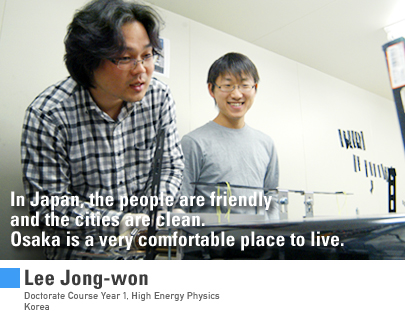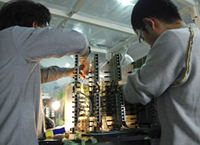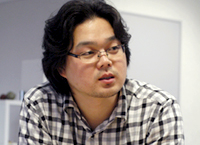
I am working to measure the process of K neutrino decay and unravel the mystery of the “weak force".
The natural world is thought to contain four forces: gravity, electromagnetism, the strong force, and the weak force. These forces affect the fundamental properties and characteristics of the matter which composes the natural world. Of these forces, the presence of the strong force and weak force are ordinarily not easily recognizable. In order to investigate the force properties, it is necessary to create particles which do not usually exist in the natural world by accelerating protons and electrons and colliding them with other matter. These created particles decay in an instant, and create new particles as they do so. By measuring this process of decay, it is possible to investigate the properties of the strong force and weak force. My primary research involves using detectors to measure the particles generated by the decay of a particle known as a K neutrino in order to understand how the weak force operates during this decay process. I am now working to prepare experiments for this purpose. Analyzing the measurement data from these experiments will apply new restrictions to parameters which affect a range of physical phenomena. As a result, I feel a large sense of responsibility and significance in these experiments.


A Campus where Students may Meet Nobel Prize-Winning Scientists
I often describe Osaka University to younger students at my university in Korea. When I do, the first thing I explain to them is that it is rare to find a university such as this one, which contains nearly all fields of physics. I also tell them how the instructors in each research group have an impressive record of accomplishments in their fields. It is for this reason that famous researchers from Japan and overseas frequently visit Osaka University for joint research, seminars, symposiums, and other events. I clearly remember the times when I met Nobel award-winning scientists Yoichiro Nambu and Toshihide Masukawa. I had been impressed by the sharp insight of his ideas when Professor Nambu spoke before on the subject of spontaneous symmetry breaking, and I was both excited and nervous to meet him in person. The next thing I tell the students in Korea is about the excellent facilities. The university maintains all kinds of equipment, including high-output lasers and particle accelerators, and experiments making extensive use of this equipment are frequent and active. There are also many opportunities for communication with other universities and research institutions, and I believe the ability to expand one's human network is one of the big advantages of Osaka University.
Using Opportunities for Inter-Cultural Exchange to Deepen One’s Understanding of Japan
When studying abroad, one concern is the comfort of life in a new country or region. In this sense, there is nothing to worry about at Osaka University. The level of public safety in Japan is extremely high to begin with, and I can safely return home by bicycle even when my research keeps me in the laboratory until late at night. There is also an on-campus support center for international students which offers kind instruction concerning housing, various procedures, scholarships, and other issues. There are also opportunities for inter-cultural exchanges with international students and the Japanese students, and participating in these dinners and excursions helps one to develop a deeper understanding of Japanese people and culture. I am particularly glad that I applied for the host family program which introduced a local Japanese family to me. Even when I do not stay with them, they take me to the famous sites and tourist areas of Japan, and I have many fond memories of my time with them. Study and research at the IPC can all be done in English, however students can also join a Japanese study program in order to expand their academic knowledge and better enjoy life in Japan. The Japanese people are kind and the cities are very clean. I hope that you too will choose Osaka University in Japan for study overseas.
